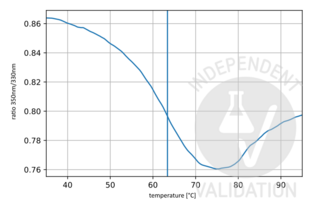Fibronectin 1 Antikörper (Biotin)
Kurzübersicht für Fibronectin 1 Antikörper (Biotin) (ABIN5596762)
Target
Alle Fibronectin 1 (FN1) Antikörper anzeigenReaktivität
Wirt
Klonalität
Konjugat
Applikation
-
-
Hersteller Produkt- Nr.
- 600-406-117
-
Hersteller
- Rockland
-
Verwendungszweck
- Fibronectin Antibody Biotin Conjugated
-
Kreuzreaktivität (Details)
- Typically less than 1 % cross reactivity against other extracellular matrix proteins was detected by ELISA against purified standards.
-
Produktmerkmale
- Synonyms: rabbit anti-Fibronectin antibody biotin conjugation, biotin conjugated rabbit anti-Fibronectin antibody, FN1, FN, Cold-insoluble globulin, CIG, Anastellin, Ugl-Y1, Ugl-Y2, Ugl-Y3
-
Aufreinigung
- Anti-fibronectin (rabbit) antibody has been prepared by immunoaffinity chromatography using immobilized antigens followed by extensive cross-adsorption against human serum proteins and collagen and non-collagen extracellular matrix proteins to remove any unwanted specificity.
-
Immunogen
-
Immunogen: Fibronectin was purified from Human plasma by binding to a denatured gelatin column followed by elution with high concentrations of arginine. The eluted material was further purified by gel filtration. Immunization occurred after single-band purity was assessed by SDS-PAGE.
Immunogen Type: Native Protein
-
Isotyp
- IgG
-
Labeling Ratio
- 10-20
-
Produktspezifische Information
-
Dieser polyklonale Kaninchen anti-Fibronektin Antikörper ist Biotin-konjugiert und eignet sich zur Detektion von Fibronektin (FN, FN1) in den Spezies Mensch, Maus, Ratte, Rind, Affe. Der Fibronektin Antikörper ist validiert für ELISA, Immunohistochemie, Immunopräzipitation und Westernblotting. Als Beleg für die Performance des Antikörpers liegen derzeit vier Produktbilder für IHC und das unfolding profile vor. Nutzen Sie unseren hochwertigen Fibronectin Antikörper, um Fibronektin zuverlässig für eine Reihe von Spezies nachzuweisen.
Fibronektine binden Zelloberflächen und verschiedene Verbindungen wie Kollagen, Fibrin, Heparin, DNA und Aktin. Fibronektine sind an der Zelladhäsion, Zellmotilität, Opsonisierung, Wundheilung und Aufrechterhaltung der Zellform beteiligt. Ist an der Osteoblastenverdichtung durch den zellvermittelten Prozess der Fibronektin-Fibrillogenese beteiligt, der für die Mineralisierung der Osteoblasten unerlässlich ist (By similarity). Beteiligt sich an der Regulierung der Ablagerung von Typ-I-Kollagen durch Osteoblasten (durch Ähnlichkeit). (UniProt)
-
-
-
-
Applikationshinweise
-
Immunohistochemistry Dilution: 1:50 - 1:200
Application Note: Anti-Fibronectin (rabbit) antibody was tested by WB, ELISA, and IHC. Assay by immunoblot was found to be reactive against Fibronectin at a dilution of 1:5,000 to 1:10,000. Assay against 1.0 μg of Fibronectin in a standard capture ELISA using Peroxidase Conjugated Streptavidin #S000-03 and ABTS (2,2'-azino-bis-[3-ethylbenthiazoline-6-sulfonic acid]) code # ABTS-100 as a substrate for 30 minutes at room temperature. A working dilution of 1:4,000 to 1:8,000 of the stock concentration is suggested for this product. For immunohistochemistry on paraffin embedded tissue dilute the product 1:50 to 1:200.
Western Blot Dilution: 1:500 - 1:5,000
Immunoprecipitation Dilution: 1:100
ELISA Dilution: 1:5,000 - 1:20,000
Other: User Optimized
-
Beschränkungen
- Nur für Forschungszwecke einsetzbar
-
-
- by
- NanoTemper Technologies
- No.
- #104084
- Datum
- 23.07.2019
- Antigen
- Fibronectin
- Chargennummer
- 39102
- Validierte Anwendung
- Unfolding Profile
- Positivkontrolle
- ABIN5596762
- Negativkontrolle
- Bewertung
Passed. ABIN5596762 showed Ti at 63.4°C and a clear unfolding profile with one unfolding event. This suggests that the antibody is properly folded and functional.
- Primärantikörper
- Sekundärantikörper
- Full Protocol
- Dilute ABIN5596762 in PBS buffer (Roth, 1058.1, lot 285231988) to get a final volume of 30µl at a concentration of 0.5µM.
- Load sample into Tycho capillary (NanoTemper Technologies, TY-C001).
- Run Tycho measurement.
- Anmerkungen
Tycho is designed to run quick and precise protein quality check experiments. Tycho uses intrinsic protein fluorescence to follow protein unfolding while running a fast thermal ramp, yielding results in 3min. A protein’s unfolding behavior is characterized by various parameters, most notably the inflection temperature (Ti). The Ti can be used to identify properly folded protein, to compare different batches, or to analyze the influence of storage/transport conditions on a protein. An absence of Ti would suggest that the protein is already unfolded and therefore most likely nonfunctional.
Validierung #104084 (Unfolding Profile)![Erfolgreich validiert 'Independent Validation' Siegel]()
![Erfolgreich validiert 'Independent Validation' Siegel]() ValidierungsbilderProtokoll
ValidierungsbilderProtokoll -
-
Format
- Lyophilized
-
Rekonstitution
-
Reconstitution Volume: 100 μL
Reconstitution Buffer: Restore with deionized water (or equivalent)
-
Konzentration
- 1.0 mg/mL
-
Buffer
-
Buffer: 0.02 M Potassium Phosphate, 0.15 M Sodium Chloride, pH 7.2
Stabilizer: 10 mg/mL Bovine Serum Albumin (BSA) - Immunoglobulin and Protease free
Preservative: 0.01 % (w/v) Sodium Azide -
Konservierungsmittel
- Sodium azide
-
Vorsichtsmaßnahmen
- This product contains Sodium azide: a POISONOUS AND HAZARDOUS SUBSTANCE which should be handled by trained staff only.
-
Lagerung
- 4 °C,-20 °C
-
Informationen zur Lagerung
- Store vial at 4° C prior to restoration. For extended storage aliquot contents and freeze at -20° C or below. Avoid cycles of freezing and thawing. Centrifuge product if not completely clear after standing at room temperature. This product is stable for several weeks at 4° C as an undiluted liquid. Dilute only prior to immediate use.
-
Haltbarkeit
- 12 months
-
-
- Fibronectin 1 (FN1)
-
Andere Bezeichnung
- FN1
-
Hintergrund
- Background: Fibronectin antibody reacts with human fibronectin in liver, tonsil, skin and kidney. Traces of contaminating antibodies have been removed by solid-phase absorption. Biotin is ammenable to conjugation to proteins for use in biochemical assays. Biotin has a very strong affinity for avidin and streptavidin, an attraction that is the strongest and most stable non-covalent interaction known. Fibronectin is found in two forms in vertebrates: soluble and insoluble. Soluble plasma fibronectin is contained in blood plasma and constitutes a large protein component. Insoluble cellular fibronectin is a large component of the extra-cellular matrix where it is secreted by many different types of cells. Fibronectin plays a large role in wound healing and cell development. Anti-fibronectin (rabbit) antibody is ideal for investigators in Cardiology, Cell Biology, Microbiology, and Immunology research.
-
Gen-ID
- 2335
-
UniProt
- P02751
-
Pathways
- Cellular Response to Molecule of Bacterial Origin, Carbohydrate Homeostasis, Autophagie
Target
-


 (1 Validierung)
(1 Validierung)




